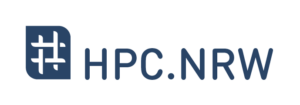
- This event has passed.
Introduction to Research Software Development with MATLAB
We are excited to announce the continuation of the successful collaboration between HPC.NRW and MathWorks for the third consecutive year, offering a comprehensive series of four workshops designed to empower researchers, engineers, and scientists. This unique series aims to enhance skills in high-performance computing (HPC), software development for research, and artificial intelligence (AI) with MATLAB.
As a (junior-) scientist you wear many hats. Among many other things you often must be a bit of a software developer to tackle the analytical problems that come up during your projects. In this third part of the Parallel Computing with MATLAB series we will present concepts and tools for your contribution to collaborative development of research software. We will give you a hands-on introduction to good development practices, writing clean code and using source-code control with MATLAB. This workshop will give you a running start when it comes to writing maintainable research software.
Workshop Series
- Parallel Computing with MATLAB
- Parallel Computing with MATLAB on the CLAIX Cluster
- Introduction to Research Software Development with MATLAB (this course)
- AI for Predictive Maintenance
Organization
- There is no seminar fee.
- Presentations will be given in English. Slides will be available after the event.
- This is an online event and will be held in Zoom. Links are sent to registered attendees with the registration confirmation.
- You can/must register per topic, i.e., for each workshop separately.
Speaker
- Dr. Thomas Künzel (MathWorks)
Course level
- Intermediate
Target audience
- Students, researchers and early career scientists
Prerequisites
- Basic MATLAB familiarity
- Some first experience in scientific programming. If you do not know what a function is, this course may not be well suited for you.
- Your MathWorks-Account
Gained skills
- What is Research Software Development? What changes when others may use your code – as opposed to writing some code only for yourself?
- The concepts and ideas behind “Clean Code” and the activity of refactoring code
- Writing and Using Unit Tests to improve code maintainability
- Using git as a local source control system. Understanding branches.
- Reproducible code environments
Registration
Course Material
Cooperation Partners
 |
 |




